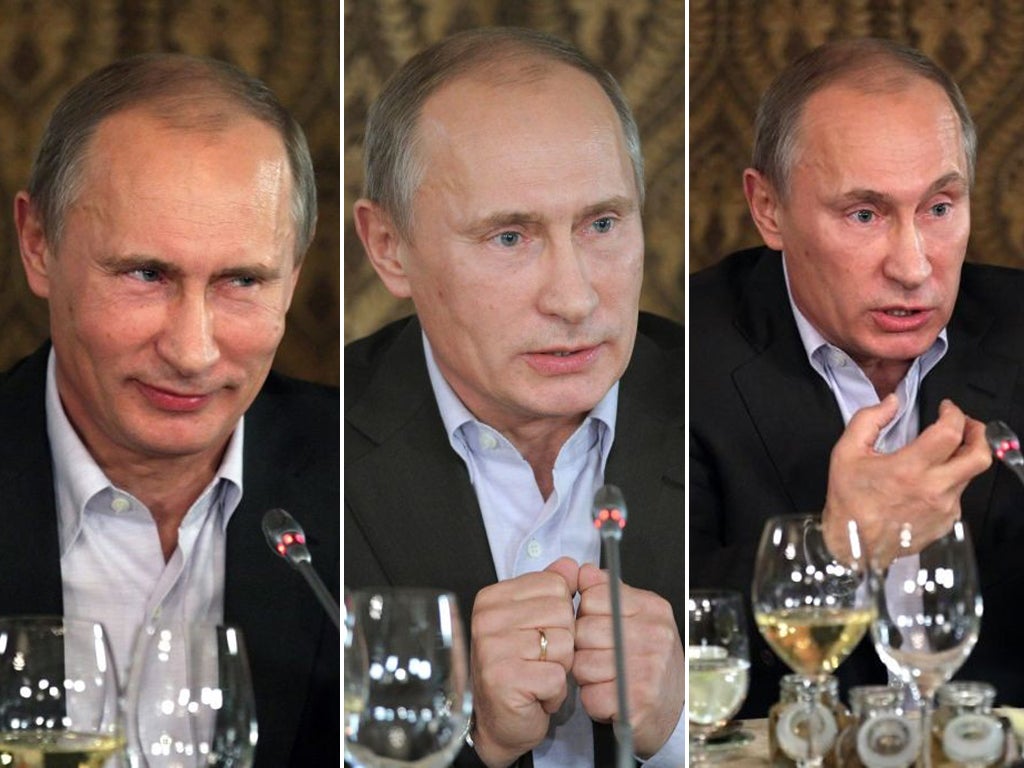Putin attacks Britain and US for 'violating Libya resolution'
In Moscow, Mary Dejevsky hears Russia's PM warn the West about 'taking sides' in Syria as it did against Gaddafi

The Russian Prime Minister, Vladimir Putin, launched a broadside against the Western intervention in Libya yesterday, describing British, French and US action as "a complete scandal and a complete affront to the international community". In "taking the side of one of the warring parties," he said, "they had committed a crude violation of the UN resolution".
Mr Putin was answering a question about Syria during a dinner with members of the Valdai group of international Russia specialists at a restaurant outside Moscow.
The sharpness of Mr Putin's response – he had said that any action against Syria that caused destruction of the kind that had happened in Libya, would be "quite unacceptable" – suggested that he would be just as combative a president internationally, if he wins a third presidential term next March, as he was in his previous two terms.
The Russian Prime Minister also indicated growing tensions with the United States over missile defence, but tempered this with assurances about Russia's readiness to assist with infrastructure projects in Afghanistan, as the US moved to withdraw.
This was the eighth year running that Mr Putin has met the Valdai group, which was set up at the initiative of the Kremlin at a time when relations between Russia and the West were at a particularly low point.
This year's venue for the three-hour question and answer session was a restaurant frequented by members of the new elite at post-Soviet Russia's first privately owned equestrian centre.
The meeting took place just six weeks after Mr Putin was nominated by the governing United Russia party to be its candidate in next year's presidential election. This endorsement, and his acceptance, virtually guarantee that Mr Putin will return to the presidency, which he left four years ago after serving the maximum two consecutive terms.
The expectation is that he will exchange jobs with Dmitry Medvedev, who was elected president in 2008. Russian commentators are using the chess term "castling"to describe their job-swap.
New constitutional provisions mean that, if elected, Mr Putin could theoretically stay at Russia's helm until 2024, as the presidential term has been extended from four years to six. He would then be 71. For a man of modest origins, who graduated in law from Lenin- grad – now once again St Petersburg – University and spent the first half of his working life in the middle ranks of the KGB, Mr Putin's rise to power, as the protégé of Boris Yeltsin, is the stuff of fantasy.
His image abroad may suffer from his KGB past, his pursuit of the Chechen war and the hard line he has taken against liberal opponents, Russians generally approve of his stern demeanour and sometimes salty language – and appreciate what they see as his restoration of order at home, and respect abroad, after the chaos and humiliations of the 1990s.
When he arrived for yesterday's dinner he looked tired and visibly older than last year, with some speculating that he had had a facelift or Botox treatment. But he quickly engaged with the questions lobbed at him, while saying little definite about his plans for Russia if he wins a third term as president. All he offered was that changing times required changes in policy and approach, while the aims – political stability and higher living standards for Russians remained the same.
He praised Mr Medvedev's performance as president, but did not explain why he appeared intent on reclaiming the presidency from him. Although Mr Putin's popularity ratings have consistently been at a level most Western politicians can only dream of since he was first elected president in 2000, his proposed return to the presidency has been met in Russia with less enthusiasm than he might have expected.
Even many of those hitherto sympathetic to him see his plan to return to the presidency as a retrograde step. The popularity of the United Russia party is also declining prompting nervousness among officials as next month's parliamentary elections approach.
'Berlusconi was one of the great politicians'
Mr Putin might have been throwing out warnings to adversaries right and left, but he had warm words for Italy's outgoing prime minister Silvio Berlusconi, whom he called "one of the great European politicians".
"For all his scandals with their well-known elements," he said, Mr Berlusconi had given the country stability. He had been impressed by him "as an open person of the sort you don't meet all that often in Europe", who "always said what he thought". He said he valued their friendship – the two men and their families have spent holidays together – and hoped that "the right people would take over to continue his cause".
* Mary Dejevsky: Russia Notebook, Part 1
* Mary Dejevsky: Russia Notebook, Part 2
* Mary Dejevsky: Russia Notebook, Part 3
Join our commenting forum
Join thought-provoking conversations, follow other Independent readers and see their replies
Comments
Bookmark popover
Removed from bookmarks